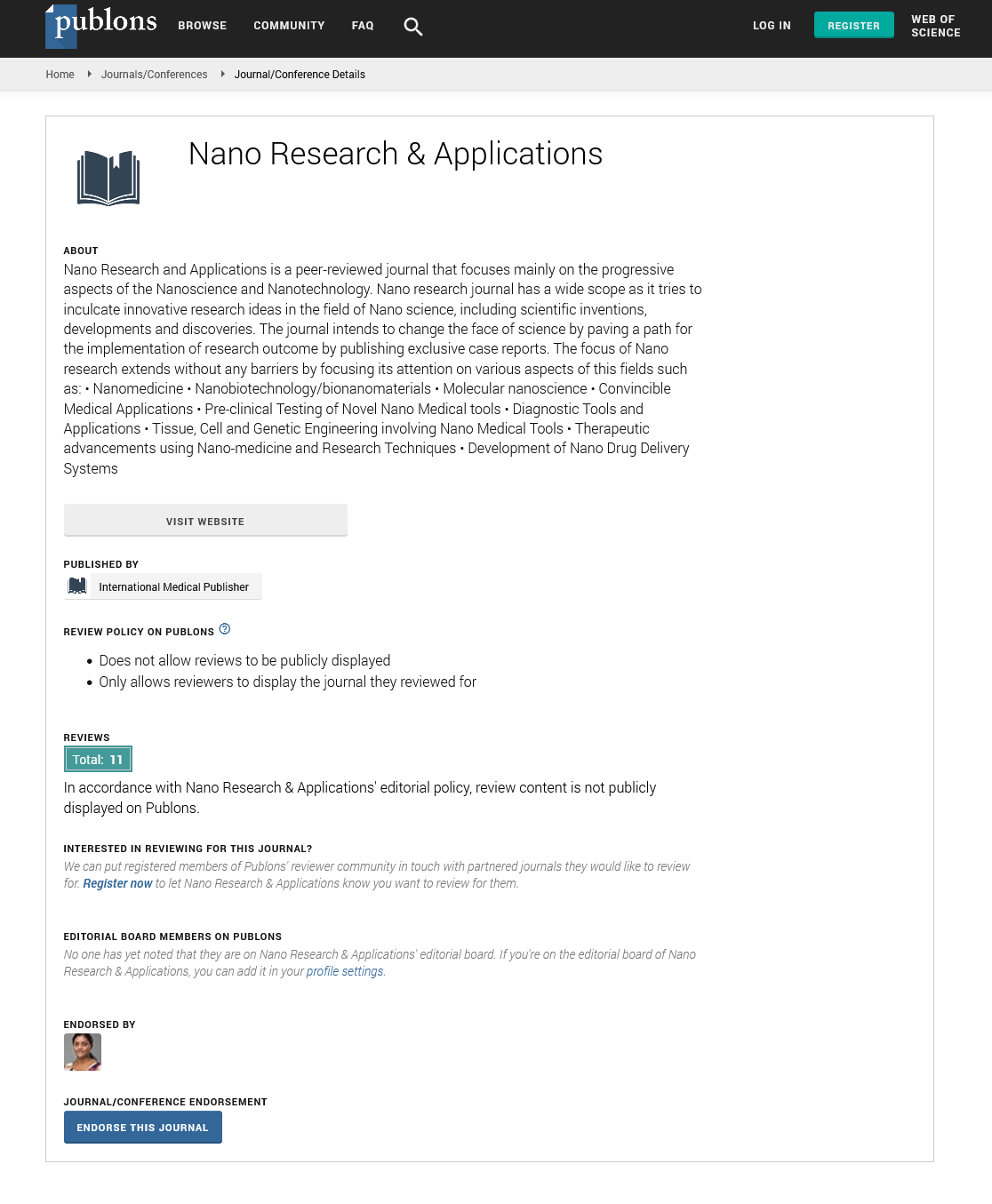ISSN : 2471-9838
Nano Research & Applications
Diversification of nanowire building blocks by post-synthesis modifications; monolayer doping and self-processing synthesis
EuroSciCon Conference on Nanotechnology & Smart Materials
October 04 -06 ,2018 Amsterdam , Netherlands
Roie Yerushalmi
Institute of Chemistry-The Hebrew University of Jerusalem, Israel
ScientificTracks Abstracts: Nano Res Appl
DOI: 10.21767/2471-9838-C6-024
Abstract
Programmable introduction of heterogeneity at the nanoscale plays a key role in the design of functional building blocks for catalysis, electronic devices, and numerous other applications. Synthetic strategies for attaining well-defined heterogeneity in structure, shape, composition and modulation of the electronic structure at selected regions of the nano system is therefore highly desired. I will present our research towards two methodologies for post-synthesis modification and symmetry breaking of semiconducting nanostructures using nanowires as the basic building blocks covering two aspects of post-synthesis modification of nanowires: (I) Ex-situ doping of silicon nanowires. Ex-situ doping enables the transformation of un-doped silicon nanowires into heterogeneously doped building blocks featuring sharp p-i-n junctions across the nanowire. Relying on surface chemistry provides an accurate dose and initial positioning together with fine control over the diffusion processes. The monolayer doping methodologies are valuable for decoupling the doping step from the nanowire synthesis step, resulting in ex-situ doping. (II) Self-processing synthesis of coinage metal-semiconductor hybrid structures. The hybrid nanostructures obtained for the coinage metals resemble the morphology of grass flowers, termed Nano-floret hybrid nanostructures consisting of a high aspect ratio SiGe nanowire (NW) with a metallic nanoshell cap. The new class of structures is useful in a variety of applications owing to the unique geometrical aspect ratio and electronic properties of the hybrid systems. The synthesis involves a sequence of selective etch and deposition steps which are self-initiated and self-terminated resulting in the hybrid nanostructures
Biography
Roie Yerushalmi has received his PhD in Chemistry from the Weizmann institute of science, Israel, in 2005 (awarded the Kennedy prize for outstanding PhD work). He pursued Postdoc in the field of Nanoscience in the lab of Prof Ali Javey at UC Berkeley from 2006-2008. In 2008, he joined the Institute Of Chemistry at the Hebrew University of Jerusalem, Israel. He is serving as an Associate Professor at the Hebrew University of Jerusalem, since 2015. His main research interests include development of new surface chemistries, atomic and molecular layer deposition, nanowire synthesis methodologies, hybrid nanostructures, ex-situ doping of nanostructures, nanostructure array assembly, and comprehensive characterization of complex nanostructured systems by application of analytical methods. Design and synthesis of hybrid nanostructures for photocatalysis, electrical and optical applications, energy harvesting. He has received a starting grant from the ERC (European Research Council), the Krill Prize, Kennedy prize, and the career development award by the Human Frontier Science Program.
E-mail: roie.yerushalmi@mail.huji.ac.il
Google Scholar citation report
Citations : 387
Nano Research & Applications received 387 citations as per Google Scholar report
Nano Research & Applications peer review process verified at publons
Abstracted/Indexed in
- Google Scholar
- China National Knowledge Infrastructure (CNKI)
- Directory of Research Journal Indexing (DRJI)
- WorldCat
- Publons
- Secret Search Engine Labs
- Euro Pub
Open Access Journals
- Aquaculture & Veterinary Science
- Chemistry & Chemical Sciences
- Clinical Sciences
- Engineering
- General Science
- Genetics & Molecular Biology
- Health Care & Nursing
- Immunology & Microbiology
- Materials Science
- Mathematics & Physics
- Medical Sciences
- Neurology & Psychiatry
- Oncology & Cancer Science
- Pharmaceutical Sciences
